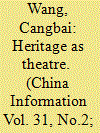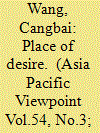| Srl | Item |
| 1 |
ID:
153638


|
|
|
|
|
| Summary/Abstract |
Since China’s signing of UNESCO’s World Heritage Convention in 1985, cultural heritage in China has become a booming industry and a key area of scholarly investigation. The mainstream literature on China’s heritage and urbanization tends to view heritage as a civilizing agent to regulate and improve the urban population. Drawing on Clifford Geertz’s notion of ‘theatre state’ and through a case study of Jiangmen, this article reconceptualizes China’s urban heritage industry as ‘theatre’. It shifts the focus away from neat political rationalities to messy ‘magical assemblages’, such as dramatic museum representation, monumental architecture and expressive ceremonies, in state-led heritage-making processes. It argues that the Chinese government makes heritage by using not only the means of political rationalities but also, and perhaps more importantly, the power of spectacle, sensation and awe. China’s heritage industry is thus as much ‘a technique of enchantment’ as ‘a technique of government’, revealing complicated processes of China’s negotiation with the Western-centred conceptualization of modernity and cultural heritage. Additionally, it draws attention to diasporic resources in urban heritage-making, broadening the existing research that has predominantly focused on the employment of nostalgic and/or exotic appeal for city branding and development.
|
|
|
|
|
|
|
|
|
|
|
|
|
|
|
|
| 2 |
ID:
127142


|
|
|
|
|
| Publication |
2013.
|
| Summary/Abstract |
Until very recently the motivation of skilled migration has been largely explained from neo-classically oriented world views coupled with an institutional focus that pays major attention to how skilled migration is driven by (economic) globalisation and sustained by inter- or intra-company economic and social connections. Little is said about how dream and aspiration have shaped migration plans and choices of destination. Although the recent development of academic literature witnesses a shift away from a narrow focus on economic logics to the human face of transnational skills, the issue of desire only accidentally emerges in most discussions. Based on in-depth interviews with mainland Chinese professional migrants in post-colonial Hong Kong, this paper foregrounds the notion of 'desire' as a conceptual vehicle to interweave economic, political and cultural dimensions within the same frame to understand the intentions and dynamics of skilled migration, and to link decision-making at the individual level to a broader geo-politics and geo-economies in which migration takes place. In-depth interviews reveal that apart from economic and career considerations, decisions to migrate were marked by aspiration and fantasy associated with cultural imagination of post-colonial Hong Kong embedded in discourses of place, border and nationhood that go beyond the specific issue of China-Hong Kong migration.
|
|
|
|
|
|
|
|
|
|
|
|
|
|
|
|